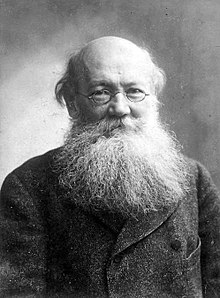Green anarchism
Appearance

Green anarchism, also known as ecological anarchism or eco-anarchism, is an anarchist school of thought that focuses on ecology and environmental issues. It is an anti-capitalist and anti-authoritarian form of radical environmentalism, which emphasises social organization, freedom and self-fulfillment.
| This article about politics is a stub. You can help out with Wikiquote by expanding it! |
| This philosophy-related article is a stub. You can help out with Wikiquote by expanding it! |
Quotes
[edit]- The implication of mutual aid is that humans see themselves as part of nonhuman nature (though distinct from it in certain ways), needing to cooperate as much with the nonhuman natural world as with each other to survive and evolve. The ecological crisis is, in fact, a social crisis: humans believe they can dominate nonhuman nature because they believe it's natural to dominate other human beings. But mutual aid holds that humans, other animals, and plants all thrive best under forms of holistic cooperation—ecosystems. It suggests that people would be much more likely to live in harmony with each other and the nonhuman world—to be ecological—in a nonhierarchical society. [...] An ecological perspective within anarchism, then, is not only about the relation of humanity to the nonhuman world, or a harmonizing of both. It sees the world holistically, thinking through phenomena in nuanced ways, attempting to follow the developmental logic of potentialities in the present in order to anticipate how they might unfold, in terms of forms of both freedom and domination. An ecological outlook translates into the very openness that characterizes anarchism. By being able to critically explore possibilities in the here and now, anarchism beckons toward a brighter future, yet only if it remains open to what's outside the given.
- Cindy Milstein, Anarchism and Its Aspirations. AK Press. 1 May 2010. pp. 58-59. ISBN 978-1-84935-029-7.
External links
[edit]- The Institute for Social Ecology.
- Articles tagged with "green" and "ecology" at The Anarchist Library.

